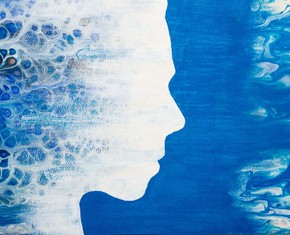The views expressed in our content reflect individual perspectives and do not represent the authoritative views of the Baha'i Faith.
The first principle of the Baha’i teachings—the independent investigation of the truth—calls for an intelligent inquiry into reality. Baha’u’llah instructs us to look into all things “with a searching eye:”
The essence of all that We have revealed for thee is Justice, is for man to free himself from idle fancy and imitation, discern with the eye of oneness His glorious handiwork, and look into all things with a searching eye. – Tablets of Baha’u’llah, p. 156.
Abdu’l-Baha wrote that Baha’u’llah gave humanity:
… various teachings for the prevention of war, and these have been scattered far and wide. The first is the independent investigation of truth; for blind imitation of the past will stunt the mind. But once every soul inquireth into truth, society will be freed from the darkness of continually repeating the past. – Abdu’l-Baha, Selections From the Writings of Abdu’l-Baha, p. 320.
Our independent inquiries can start with the scriptures of the world’s great Faiths. In the Kalama Sutta, the Buddhist “charter of free inquiry,” the Buddha tells us:
Do not go by reports (repeated hearing), by legends, by traditions, by rumours, by scriptures, by surmise, conjecture and axioms, by inference and analogies, by agreement through pondering views, by specious reasoning or bias toward a notion because it has been pondered over, by another’s seeming ability, or by the thought, this monk (contemplative) is our teacher. – The Buddha, Kamala Sutta.
Shoghi Effendi, the Guardian of the Baha’i Faith, echoed this sentiment when writing to a recent graduate who had studied the Baha’i teachings. The “searching eye,” he said, should be applied to all things, especially the teachings of the Faith itself:
It is hoped that all the Baha’i students will follow the noble example you have set before them and will, henceforth, be led to investigate and analyse the principles of the Faith and to correlate them with the modern aspects of philosophy and science. Every intelligent and thoughtful young Baha’i should always approach the Cause in this way, for therein lies the very essence of the principle of independent investigation of truth. – Shogi Effendi, undated letter quoted in a compilation on Scholarship, prepared by the Research Department of the Universal House of Justice, 1995.
However, the independent investigation of reality is not just an intellectual principle—ultimately, the Baha’i teachings say, it will prove essential for achieving justice and the unity of humankind. This individual effort to use the mind and decide for oneself results in the intellectual diversity which provides the potential for a community, through consultation, to reach a more complete understanding of reality. This in turns leads to the understanding of the unity of humankind, and ultimately, justice:
The shining spark of truth cometh forth only after the clash of differing opinions.- Abdu’l-Baha, Selections from the Writings of Abdu’l-Baha. p. 87.
What is true for the life of the individual also has parallels in human society. Baha’is see the human species as an organic whole, the leading edge of the evolutionary process. Human consciousness necessarily operates through an infinite diversity of individual minds and motivations—and in no way detracts from our essential unity as a species. Indeed, it is precisely an inhering diversity that distinguishes unity from homogeneity or uniformity.
The Baha’i teachings say that the peoples of the world are now experiencing their collective coming-of-age:
All created things have their degree, or stage, of maturity. The period of maturity in the life of a tree is the time of its fruit bearing. The maturity of a plant is the time of its blossoming and flower. The animal attains a stage of full growth and completeness, and in the human kingdom man reaches his maturity when the lights of intelligence have their greatest power and development. …
Similarly, there are periods and stages in the life of the aggregate world of humanity, which at one time was passing through its degree of childhood, at another its time of youth but now has entered its long presaged period of maturity, the evidences of which are everywhere visible and apparent. Therefore, the requirements and conditions of former periods have changed and merged into exigencies which distinctly characterize the present age of the world of mankind. That which was applicable to human needs during the early history of the race could neither meet nor satisfy the demands of this day and period of newness and consummation. Humanity has emerged from its former degrees of limitation and preliminary training. Man must now become imbued with new virtues and powers, new moralities, new capacities. New bounties, bestowals and perfections are awaiting and already descending upon him. The gifts and graces of the period of youth, although timely and sufficient during the adolescence of the world of mankind, are now incapable of meeting the requirements of its maturity. The playthings of childhood and infancy no longer satisfy or interest the adult mind. – Abdu’l-Baha, The Promulgation of Universal Peace, pp. 438-439.
Through this emerging maturity of the entire human race, Baha’is believe, the principle of unity in diversity will ultimately find its fullest expression.
In the next essay in this series, we will look at how the intellectual diversity that results from independent investigation forms the essence of true consultation and human connection.
















Comments
Sign in or create an account
Continue with Googleor